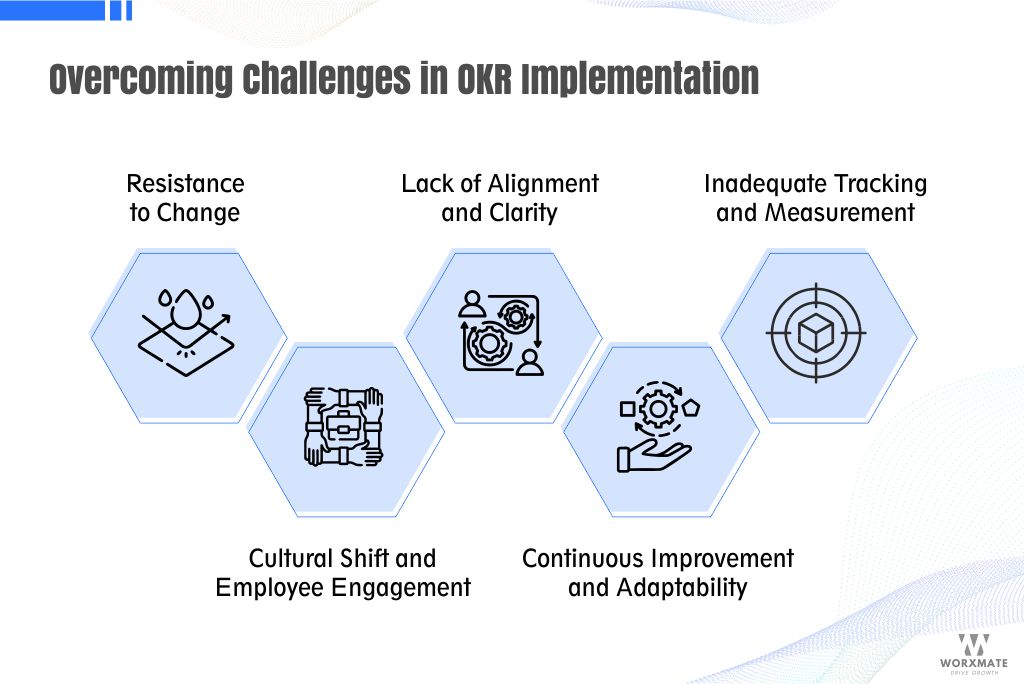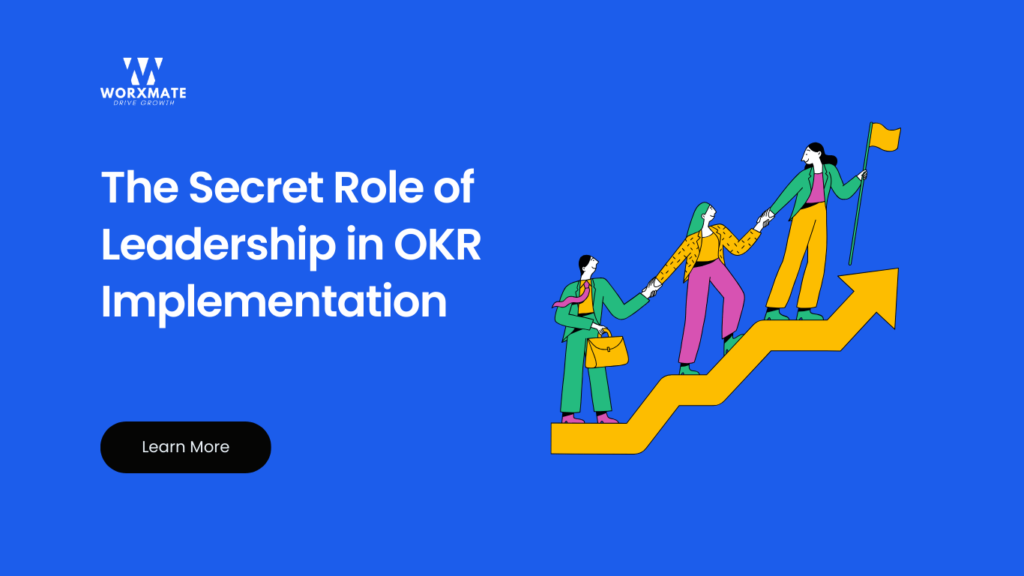In the dynamic landscape of today’s business world, organizations constantly strive to set and achieve ambitious goals that drive growth and success. One framework that has gained significant traction in recent years for goal-setting and alignment is Objectives and Key Results (OKRs). The effectiveness of OKRs hinges greatly on the leadership’s involvement and commitment to implementation.
OKRs are crucial for organizations as they provide a clear roadmap for achieving goals and fostering alignment, focus, and accountability across all levels. By setting ambitious yet measurable objectives and defining key results, OKRs empower teams to prioritize initiatives and track progress effectively.
This framework encourages transparency, collaboration, and innovation, driving continuous improvement and organizational success. In a rapidly changing business environment, OKRs enable adaptability and agility, helping organizations stay competitive and responsive to market dynamics.
The Critical Role of Leadership in OKR Implementation
-
Setting Clear Objectives and Expectations
Effective leadership begins with setting clear objectives and expectations for the organization. By articulating a compelling vision and mission, leaders provide a roadmap for the entire workforce. They define measurable objectives that align with the organization’s strategic priorities and reflect its aspirations for growth and impact.
-
Cascading OKRs Throughout the Organization
Leadership’s role extends to cascading OKRs throughout the organization. Communication is key in ensuring that every individual and team understands how their work contributes to the broader objectives of the organization. Leaders must ensure alignment between individual and team OKRs and the overarching organizational goals, fostering cohesion and synergy across departments.
-
Fostering a Culture of Transparency and Accountability
Leadership plays a crucial role in fostering a culture of transparency and accountability within the organization. By encouraging open communication and feedback, leaders create an environment where employees feel empowered to share ideas, raise concerns, and collaborate effectively. Furthermore, leaders hold teams accountable for their Key Results, emphasizing the importance of delivering measurable outcomes.
-
Providing Resources and Support
Leadership must provide the necessary resources and support for successful OKR implementation. This includes allocating budget, manpower, and technology required to execute initiatives aligned with the organization’s objectives. Additionally, leaders offer guidance and support to teams, helping them overcome obstacles and achieve their Key Results.

Overcoming Challenges in OKR Implementation
While the Objectives and Key Results framework has proven to be a powerful tool for goal-setting and performance tracking, organizations often encounter challenges during the implementation process.
Addressing these challenges requires proactive leadership and strategic interventions to ensure the successful execution and adoption of OKRs across all levels of the organization.
-
Resistance to Change
One of the most common hurdles in OKR implementation is the resistance to change. Employees may be accustomed to traditional goal-setting methods, and the introduction of OKRs may be met with skepticism and apprehension. Effective leaders acknowledge and address these concerns head-on.
By transparently communicating the reasons behind the shift to OKRs, and emphasizing the benefits for both individual growth and overall organizational success, leaders can help alleviate resistance. Leaders play a pivotal role in cultivating a culture that values adaptability and continuous improvement.
When employees witness leadership embracing change and actively participating in the OKR process, it sets a precedent for the entire organization. This demonstration of commitment and openness encourages employees to embrace the new methodology with confidence.
-
Lack of Alignment and Clarity
Leaders must take the initiative to ensure that objectives are interconnected and supportive of the organization’s overall mission. Regular communication and collaboration across departments are essential for fostering alignment.
Leaders can facilitate cross-functional workshops and meetings to promote a shared understanding of organizational objectives.
By providing a platform for teams to discuss their OKRs and how they contribute to broader goals, leaders enhance alignment and clarify the interconnectedness of various initiatives.
This approach not only mitigates misalignment but also encourages a sense of collective responsibility toward shared objectives.
-
Inadequate Tracking and Measurement
This can undermine the effectiveness of OKRs. Leaders must invest in suitable tools and systems that enable real-time monitoring of progress. This ensures that teams have the necessary resources and support to track their Key Results effectively.
Training programs focused on OKR methodology and measurement techniques are crucial for empowering employees with the skills needed to navigate tracking challenges.
Leaders can organize workshops or provide access to online training modules, offering practical guidance on setting realistic Key Results, choosing appropriate metrics, and leveraging technology for efficient progress tracking.
-
Cultural Shift and Employee Engagement
Implementing OKRs often requires a cultural shift within the organization. Leaders need to foster an environment that values transparency, collaboration, and continuous improvement.
This cultural transformation involves engaging employees at all levels and empowering them to actively participate in the OKR process.
Leaders can encourage regular check-ins and feedback sessions, creating opportunities for employees to discuss progress, share insights, and address challenges collaboratively.
By incorporating employee input into the OKR refinement process, leaders not only strengthen employee engagement but also enhance the relevance and effectiveness of the OKR framework.
Recognition and celebration also play a crucial role in fostering a positive cultural shift. Leaders should acknowledge and reward achievements, whether they are individual milestones or team successes aligned with OKRs.
This reinforcement helps create a sense of accomplishment and reinforces the connection between individual efforts and organizational objectives.
-
Continuous Improvement and Adaptability
OKR implementation is an iterative process that requires continuous improvement. Leaders must remain adaptable and responsive to changing circumstances. Regular reviews and retrospectives help leaders identify areas for enhancement and adjustment.
Leaders should facilitate open discussions about the effectiveness of OKRs, seeking feedback from employees on the challenges they face and the improvements they suggest.
This collaborative approach not only identifies potential issues but also demonstrates a commitment to ongoing refinement. Leaders can then make informed decisions to adapt the OKR strategy, ensuring its continued relevance and impact on organizational success.
Conclusion
Effective leadership is indispensable in driving successful OKR implementation and maximizing organizational success. By setting clear objectives and expectations, cascading OKRs throughout the organization, fostering a culture of transparency and accountability, and providing resources and support, leaders create an environment where OKRs thrive as a catalyst for growth and innovation.
By overcoming challenges and leading by example, leaders empower their teams to achieve extraordinary results and propel the organization toward its strategic objectives.
Experience seamless OKR implementation with Worxmate, the Best OKR Software designed to empower leaders and teams. Align goals, track progress, and achieve success effortlessly. Try Worxmate today and transform your organization’s performance!




